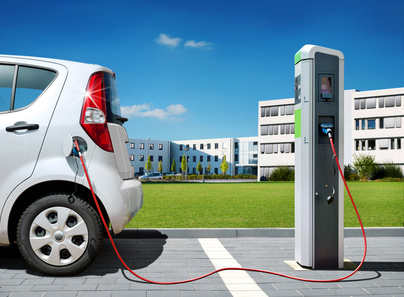CCAP Becomes a Member of the “China Association of Automobile Manufacturers”
As the first certification authority in China, the CCAP (China Certification Centre for Automotive Products) became a member of the China Association of Automobile Manufacturers (CAAM). CAAM is a Non-Profit-Organization, operating in various areas of China’s automotive industry, and has nearly 2,600 members. CAAM itself is a member of the Organisation Internationale des Constructeurs d’Automobiles (OICA), which is an advocacy group of the automotive industry.
CAAM was founded in Beijing in 1987. China Association of Automobile Manufacturers (CAAM) gathers statistics, keeps track of industry technology and economic information to follows the trends in market and technology at home and abroad. CAAM also tracks technical advances in regards to energy-saving and new energy technologies, intellectual property, circular economy and remanufacturing, and auto safety. They provide up to date automotive information services for enterprises, government departments and the public through multiple approaches such as information release conferences, websites and publications.
CAAM also provides standards, certifications, tests and other services to the domestic and foreign automotive industry, government departments and other organizations. CAAM`s aim is to play a role in the sustainable development of the Chinese automotive industry.
The CCAP is the Chinese certification authority, conducting automotive certifications on a national and international level. Their certification is based on the Chinese guidelines and laws such as the GB Standards and the corresponding Implementation rules. Their goal is to maintain high standards in their certifications as set by the Chinese government in regards to safety.
To implement the objectives, the CCAP employs specialized, professional auditors who are trained at state institutions focusing in the area of product certification. All of the auditors have extensive experience in the automotive sector. In addition, the CCAP have testing laboratories which are accredited by CNAS (China National Accreditation Service for Conformity Assessment). These test labs are focused on safety and flammability testing of automotive products.
MPR China Certification GmbH has a very strong relationship with the CCAP. We will exhibit jointly with the CCAP at the next IZB trade show in October. You can learn more about our trade fair experience here.
Furthermore MPR China Certification GmbH was the only non-Chinese company awarded as an “Outstanding Certification Company” by the CCAP in 2013.
New GB/T Standard (GB/T 32580.301-2016) published
A new GB/T Standard (GB/T 32580) was issued on April 6, 2016 and will be implemented on November 1, 2016. This standard contains the requirements for railway applications fixed installations of a.c. switchgears. The standard is divided into several parts. GB/T 32580.1-2016 contains requirements for single-phase circuit-breakers with Un above 1 kV whereas the GB/T 32580.2-2016 is designed for single-phase disconnectors, earthing switches and switches with Un above 1KV. GB/T 32580.301-2016, GB/T 32580.302-2016, and GB/T 32580.303-2016 are designed for measurement, control and protection devices for specific use in a.c. transformers.
All of the GB/T Standards have an IEC equivalent as stated below.
| GB/T Standard | IEC Standard |
| GB/T 32580.1-2016 | IEC 62505-1:2009 |
| GB/T 32580.2-2016 | IEC 62505-2:2009 |
| GB/T 32580.301-2016 | IEC 62505-3-1:2009 |
| GB/T 32580.302-2016 | IEC 62505-3-2:2009 |
| GB/T 32580.303-2016 | IEC 62505-3-3:2009 |
Are you looking for more information regarding the new GB Standard? If so, please call or email us anytime. Write us an Email or call us: UK: +44 2071931135, Rest of Europe: +49 692713769150, US: +1 773 654-2673.
Also check our website if you want more information regarding CCC certification, the CCC certification process, CCC costs, and more information about our all-inclusive CCC certification package. You may want to look at our references page to see what some our clients have to say about us.
For more detailed information, please download our free booklet “CCC Made Easy” here. You may also consider our book “A Brief Guide to CCC: China Compulsory Certification”, which can be ordered directly on Amazon here.
The International Forum on Chinese Automotive Certification and Accreditation (IFCACA) took place in the course of the “World Certification Day”.
During the event several press conferences were held, for instance by the International Motor Vehicle Certification System Study, the press conference of PHEV Ratings or the first batch result releasing meeting of C-GTRA. The purpose was to promote a new type of green certification in the auto industry and demonstrate the achievements regarding vehicle testing and certification.
In general, certification an accreditation are crucial for improving quality management. The IFCACA was the first big event focusing on certification and accreditation in the Chinese automotive industry. The event is expected to strengthen and boost the application and innovation progress of certification and accreditation in the Chinese auto industry.
If you would like to get more information regarding CCC certification, the CCC certification process, the CCC costs and more information about our all-inclusive CCC certification package.
Do you have any questions about CCC certification in the automotive industry? If so, write us an Email or call us: UK: +44 2071931135, Rest of Europe: +49 692713769150, US: +1 773 654-2673.
For more detailed information, please download our free booklet “CCC Made Easy” here. You may also consider our book “A Brief Guide to CCC: China Compulsory Certification”, which can be ordered directly on Amazon here.
CFDA: New Regulations for the Certification of Denture Implants and 5 additional Products have been published
The CFDA (China Food and Drug Administration) published revised versions of the regulations, which are dealing with the technical verification for the registration of 6 products, in 2016. The intention of that was the improvement of the administration and consultation during the CFDA product registration as well as the review during the registration process.
The revised regulations for medical products of class III include the following products:
- Denture implants
- Dental fillings made out of poly material
- Cerebral shunt for single use
- Surgical yarn
- Posterior fixation system for the spine
- Placeholders made out of synthetic material (Cages) for spinal fusion
There are special requirements for medical products of class III, which are implanted in the human body or which serve life support. These products are a potential risk for the human body. Hence, they have to be checked through product tests and clinical studies.

For the producers of medical products, it is often hard to assess whether a CFDA registration is needed for their products. Moreover, it is hard to assess to which product class their products belong.
Furthermore, the classification is also a decisive influencing factor regarding the costs and the duration of the CFDA registration process . Hereby, it is important to know that the classification in China is not always oriented towards the regulations in Europe (e.g. Regulation 93/42/EWG). Therefore, it is possible that the CFDA classifies products differently than the European authorities.
A well-founded evaluation if a product needs CFDA and to which class it belongs, facilitates the whole certification process and prevents unscheduled costs.
For more information, call us directly (UK: +44 2071931135, Rest of Europe: +49-69-2713769150, US: +1 773 654-2673) or send us an email.
CRCC: Joint Event of the Chinese Authorities on the „World Accreditation Day“
The “World Accreditation Day” was founded by the International Accreditation Forum (IAF) and the International Laboratory Accreditation Cooperation (ILAC) in order to strengthen the awareness regarding accreditation and certification. The “World Accreditation Day” is celebrated worldwide on June 9th each year. In Beijing they celebrated it on June 7th, 2016 with an event according “Certification and Accreditation Support Going Global of China High Speed Railway”. This event was organized by the CNCA, AQSIQ and CRG (China Railway Group). Among the speakers were the director of the CNCA, Sun Dawei, important representatives of the AQSIQ, and high-ranking employees of several institutions for railway transport.
On the day of the event the CNCA and CRG signed a cooperation agreement in order to strengthen the development of the high speed railway network in China. Matter of this agreement is also the further expansion of the inspection and certification systems for public railway transport. This certification should lead to an increase in product quality and security in the railway industry, as well as the sustainable development of the national railway industry.
The Chinese government strongly supports the development of the national railway industry, and rail network for high speed trains for several years. They recently announced in their five-year plan that they will maintain this course. China already had the worldwide largest high speed railway network, with approximately 19,000 km, in 2015. Additional 10,000 km are under construction.
Certain railway products need a CRRC certification. The responsible authority for CRCC certification is the China Railways Test & Certification Center (CRCC), which was renamed from Railways Product Certification Center, in 2003.

If you are interested in CRRC certification of railway products, do not hesitate to contact us.
- We verify if your product needs CRCC certification.
- We prepare a non-binding offer for the CRCC certification, in order to give you an overview about the costs and effort needed.
- If you decide to work with us, we guide you through the whole certification process. Moreover, we take on the whole communication with the authorities, we handle the product tests in China, and we organize the factory audit for you.
- We pay all application and testing fees to the Chinese authorities.
- We will make sure that your CRCC certification process will proceed as problem-free and fast as possible, with the minimum effort for your company.
Also in case you have general questions regarding CRCC certification you can call us directly (UK: +44 2071931135, Rest of Europe: +49-69-2713769150, US: +1 773 654-2673) or send us an email.
CCC: New Implementation Rules for Alarm Products for Vehicles
In addition to the CNCA Implementation Rule, the GB standard GB 20816-2006 (Vehicle security alarm systems – Passenger cars) is comparable to the international Standard IEC 60839-10-1:1995, and GA/T 553 (General requirements of vehicle security alarm network system) are relevant.
The CCC certification of alarm products for vehicles includes the tests of the following points:
- Protection class
- Function
- Electric security
- Environmental compatibility / environmental adaptation
- Electromagnetic compatibility (EMC)
- Remote control system

Are you looking for more information regarding the new CNCA Implementation Rules for alarm products for vehicles? Do you have any questions about the application for certification modification? Write us an e-mail or call us: UK: +44 2071931135, Rest of Europe: +49 692713769150, US: +1 773 654-2673.
Also check our website if you want more information regarding CCC certification, the CCC certification process, CCC costs, and more information about our all-inclusive CCC certification package. You may want to look at our references page to see what some our clients have to say about us.
For more detailed information, please download our free booklet “CCC Made Easy” here. You may also consider our book “A Brief Guide to CCC: China Compulsory Certification”, which can be ordered directly on Amazon here.
CEL: New Layout with QR-Code for the China Energy Label Announced
The new layout for the China Energy Label (CEL) was introduced at the annual Energy Efficiency Conference, held in Beijing at the end of May 2016. The most important change is that a QR-Code was added to the label which makes it easier for customers to check additional energy efficiency information by using their smartphones. The new label and related regulatory changes were implemented on June 1, 2016.
The annual Energy Efficiency Conference is organized to further promote the energy efficiency of electronic products and the “green development” of China. Leading manufacturers are using this event every year for new product launches and presentation.
The CEL label was implemented in 2005 and now covers 33 energy-using products from 12 product groups in 5 different categories, including household appliances, industrial equipment, commercial equipment, office lighting products and electronic office products.
During the conference the National Development and Reform Commission (NDRC), Ministry for Industry and AQSIQ jointly published the first catalogue with the 21 “leader” companies for in total 150 energy efficient products.
CQC: Additional GB/T Standards for the Voluntary CQC Mark Certification of Electric Vehicles Planned
The National Automotive Standardization Technical Committee has been collecting expert`s proposals for further expanding the existing GB/T standards for the voluntary CQC Mark Certification of electric vehicles and related systems. The Chinese Government has been promoting the expansion of electro mobility over the past years. With the establishment of new certification possibilities, the intension is to further advance standards for the quality and safety of the new technologies.

Previously we reported in our news section that some GB/T standards were recently updated (e.g. for the voluntary CQC Mark Certification of Connection Sets for Conductive Charging, Communication Protocols Between Off-Board Conductive Charger and Battery Management System as well as for Electrical Machines and Controllers for Electric Vehicles) in order to adapt them to the latest technological developments.
Since these announcements manufacturers have been able to apply for certification in accordance with the new GB-standards or apply for an update to their existing certificates with the CQC.
You can find more information about the Voluntary CQC Mark Certification here.
If you have any questions regarding Voluntary CQC Mark Certification, please don’t hesitate to contact us any time. Write an email or call us directly (UK: +44 2071931135, Rest of Europe: +49-69-2713769150, US: +1 773 654-2673).



